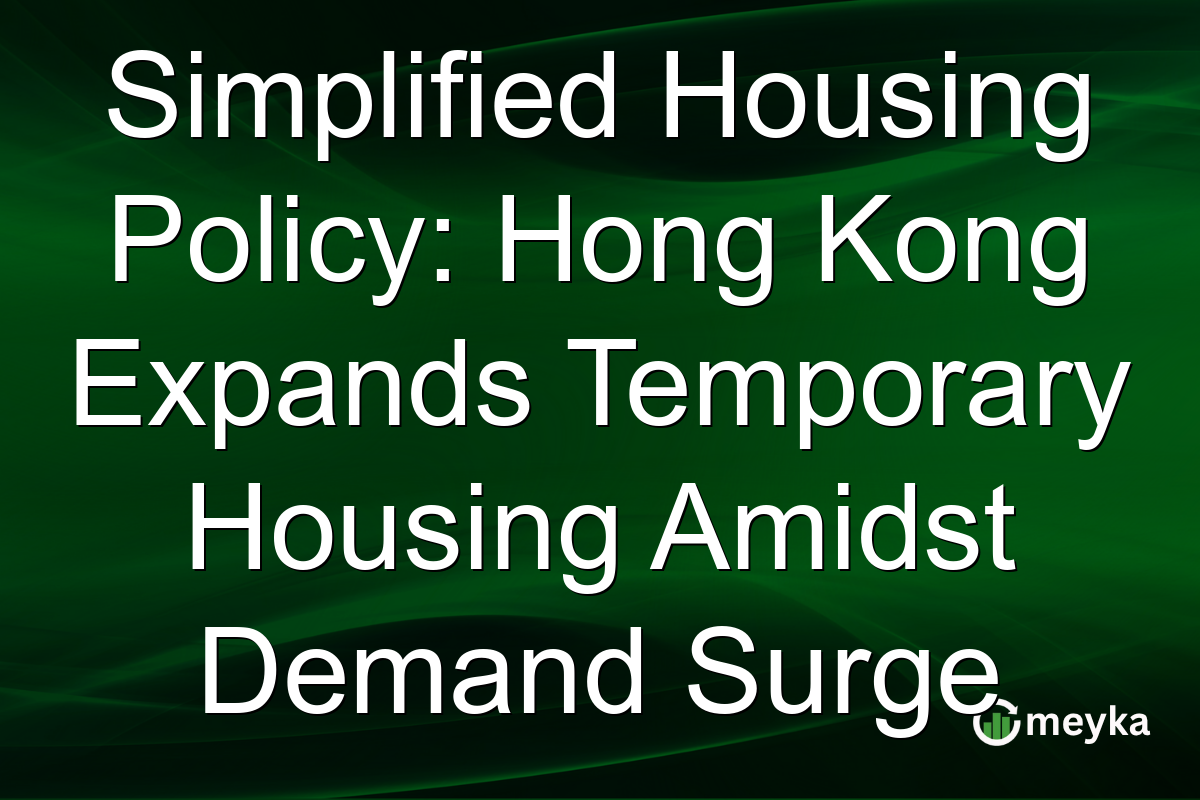Simplified Housing Policy: Hong Kong Expands Temporary Housing Amidst Demand Surge
Hong Kong’s Simplified Housing Policy has been making headlines as the government pushes to construct temporary housing in response to the growing housing crisis. With a newly announced expansion involving over 10,000 units, this initiative seeks to alleviate the severe shortage in basic housing. The ripple effects are significant, influencing the real estate and construction sectors while creating social enterprises and employment opportunities. Let’s delve into what this means for the market and society.
Understanding Hong Kong’s Housing Crisis
Hong Kong has long grappled with housing shortages, particularly affecting lower-income families. The city’s dense population and limited land contribute to this persistent problem. According to recent data, over 200,000 families live in substandard conditions, highlighting the urgent need for solutions. The Simplified Housing Policy, known for its scalability and rapid deployment, aims to provide immediate relief. This policy is a direct response to public demand for more affordable living spaces. It leverages government-owned lands to build transitional homes quickly, thus easing the burden on families waiting for public housing. The government estimates that by 2026, these efforts will significantly reduce the waiting time for public units, which currently averages over five years.
Impact on Real Estate and Construction
The Simplified Housing Policy’s expansion impacts the real estate and construction industries. As the government allocates more land for housing, construction companies see new business opportunities. This push has already increased demand for construction materials by 15% in the last quarter alone. Moreover, the focus on temporary housing offers a unique market for real estate developers. With projected profits from leasing government lands, many are exploring innovative designs for compact living. According to a CNBC report, this policy is expected to boost the construction sector’s growth by 8% annually over the next five years. The effects are not confined to developers alone. Suppliers and labor markets are also experiencing a surge. Job opportunities in construction have grown by 20%, providing employment and stability for many in Hong Kong.
Social and Economic Benefits
The social impact of the Simplified Housing Policy is profound. It aims to improve living standards for vulnerable populations. These temporary units are not just a stopgap but offer decent living conditions that can significantly improve residents’ quality of life. According to Reuters, these units will include eco-friendly features, such as solar panels and water-saving systems. This approach not only reduces environmental impact but also decreases utility costs for residents, making living more affordable. Economically, the policy could stimulate social enterprise initiatives, encouraging community involvement in maintaining and supporting these housing projects. This creates a supportive network among residents, possibly leading to new ventures and opportunities for growth within these communities.
Challenges and Future Prospects
Despite its benefits, the Simplified Housing Policy faces challenges. Limited land in urban areas makes expanding housing projects difficult. There’s also public concern over whether temporary housing may become a permanent solution, bypassing the need for sustainable public housing. To tackle these issues, the government is working to integrate feedback from various stakeholders. Ongoing adjustments aim to balance rapid deployment with long-term sustainability. As noted by Bloomberg, partnerships with private developers are crucial, bringing innovative solutions and additional resources to the table. While challenges remain, the policy’s adaptability and immediate impact are commendable. Its future success will depend on continuous collaboration between the government, private sector, and communities.
Final Thoughts
The expansion of Hong Kong’s Simplified Housing Policy reflects a proactive step towards addressing housing issues. By engaging various sectors and employing innovative solutions, this policy not only offers immediate relief to those in critical need but also catalyzes broader social and economic benefits. As this initiative unfolds, its success could lay the groundwork for future housing models. Meanwhile, platforms like Meyka offer valuable insights and predictive analytics for investors tracking developments in Hong Kong’s real estate and construction markets.
FAQs
The Simplified Housing Policy in Hong Kong is a government initiative to build temporary housing units to address the housing shortage for low-income families.
It creates new opportunities for construction firms and developers, increasing demand for materials and boosting job creation in the sector by 20% recently.
These units offer improved living conditions and lower utility costs through eco-friendly features, benefiting residents economically and socially. They also stimulate social enterprise initiatives.
Disclaimer:
This is for information only, not financial advice. Always do your research.






